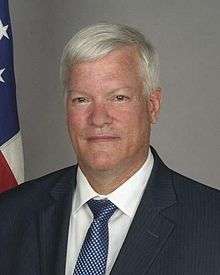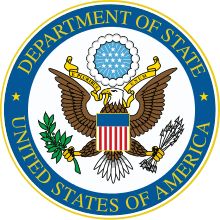United States Ambassador to Somalia
| Ambassador of the United States to Somalia
السفارة الأمريكية في الصومال | |
|---|---|
|
Seal of the United States Department of State | |
| Inaugural holder |
Stephen Schwartz as Ambassador Extraordinary and Plenipotentiary |
| Formation | July 5, 1960 |
| Website | U.S. VPP - Somalia |
The United States Ambassador to Somalia is the most senior diplomatic representative of the United States federal government assigned to Somalia. The U.S. maintains a non-resident diplomatic mission in Nairobi for Somalia and its constituent autonomous regions.[1] In January 2013, a senior American government official indicated that the United States could eventually reopen its embassy in Mogadishu, which had closed in the early 1990s.[2] In June 2014, the U.S. State Department also announced that it would soon name a new ambassador to Somalia.[3] In February 2015, U.S. government nominated its first official ambassador since 1991.[4]
Overview
Diplomatic relations between the United States and Somalia started in 1960, when the Somali Republic gained independence. The U.S. immediately recognized the Somali government and moved to establish diplomatic relations. The American embassy in Somalia's capital Mogadishu was established on July 1, 1960, with Andrew G. Lynch as Chargé d'Affaires ad interim. He was promoted to Ambassador Extraordinary and Plenipotentiary four days later on July 5, 1960.
After the collapse of the Siad Barre regime and the start of the civil war in the early 1990s, the U.S. embassy closed down. However, the American government never formally severed diplomatic ties with Somalia. The United States maintained a regular dialogue with the reconstituted Somali central government through a special envoy based in the Kenyan capital, Nairobi, before reopening its Mission to Somalia in 2013.[2]
In January 2013, the U.S. announced that it was set to exchange diplomatic notes with the new Federal Government of Somalia, re-establishing official ties with the country for the first time in 20 years. According to the Department of State, the decision was made in recognition of the significant progress that the Somali authorities had achieved on both the political and war fronts.[2][5] A senior American government official also indicated after the announcement that the United States could eventually reopen its embassy in Mogadishu.[2]

Since the reopening of the U.S. Mission to Somalia in fall of 2013,[6] the United States has continued to be represented in Somalia by a special envoy based in Nairobi and titled a Special Representative. On August 26, 2013, the US appointed James P. McAnulty as its Special Representative to Somalia.[7][8]
In 2014, U.S. President Barack Obama nominated Katherine Dhanani to become the first U.S. Ambassador to Somalia since the U.S. closed its embassy there in 1991, but she later withdrew from the nomination process for personal reasons.[9]
In June 2016 Stephen Schwartz swear in the first U.S. ambassador to Somalia in a quarter century, Ambassador Stephen Schwartz took his oath Monday in Washington, following his Senate confirmation in May. [10] Schwartz's appointment comes a year after U.S. Secretary of State John Kerry made an unannounced visit to Mogadishu.
Ambassadors
U.S. diplomatic terms
After 1915, The United States Department of State began classifying ambassadors as career Foreign Service Officers (FSOs) for those who have served in the Foreign Service for a specified amount of time.
Political appointee
A person who is not a career foreign service officer, but is appointed by the president (often as a reward to political friends).
Appointed
The date that the ambassador took the oath of office; also known as “commissioning”. It follows confirmation of a presidential appointment by the Senate, or a Congressional-recess appointment by the president. In the case of a recess appointment, the ambassador requires subsequent confirmation by the Senate.
Presented credentials
The date that the ambassador presented his letter of credence to the head of state or appropriate authority of the receiving nation. At this time the ambassador officially becomes the representative of his country. This would normally occur a short time after the ambassador’s arrival on station. The host nation may reject the ambassador by not receiving the ambassador’s letter, but this occurs only rarely.
Terminated mission
Usually the date that the ambassador left the country. In some cases a letter of recall is presented, ending the ambassador’s commission, either as a means of diplomatic protest or because the diplomat is being reassigned elsewhere and replaced by another envoy.
Chargé d'affaires
The person in charge of the business of the embassy when there is no ambassador commissioned to the host country. See chargé d'affaires.
Ad interim
Latin phrase meaning "for the time being", "in the meantime". See ad interim.
- Andrew G. Lynch – Career FSO
- Title: Ambassador Extraordinary and Plenipotentiary
- Appointed: July 5, 1960
- Presented credentials: July 11, 1960
- Terminated mission: Left post May 7, 1962
- Horace G. Torbert, Jr. – Career FSO[11]
- Title: Ambassador Extraordinary and Plenipotentiary
- Appointed: February 17, 1962
- Presented credentials: January 31, 1963
- Terminated mission: Left post August 29, 1965
- Raymond L. Thurston – Career FSO
- Title: Ambassador Extraordinary and Plenipotentiary
- Appointed: September 1, 1965
- Presented credentials: November 23, 1965
- Terminated mission: Left post December 15, 1968
- Fred L. Hadsel – Career FSO
- Title: Ambassador Extraordinary and Plenipotentiary
- Appointed: May 13, 1969
- Presented credentials: June 28, 1969
- Terminated mission: Left post July 18, 1971
- Matthew J. Looram, Jr. – Career FSO[12]
- Title: Ambassador Extraordinary and Plenipotentiary
- Appointed: February 15, 1972
- Presented credentials: March 13, 1972
- Terminated mission: Left post July 5, 1973
- Roger Kirk – Career FSO
- Title: Ambassador Extraordinary and Plenipotentiary
- Appointed: September 20, 1973
- Presented credentials: October 8, 1973
- Terminated mission: Left post February 20, 1975
- John L. Loughran – Career FSO
- Title: Ambassador Extraordinary and Plenipotentiary
- Appointed: May 8, 1975
- Presented credentials: August 13, 1975
- Terminated mission: Left post November 5, 1978
- Donald K. Petterson – Career FSO
- Title: Ambassador Extraordinary and Plenipotentiary
- Appointed: October 12, 1978
- Presented credentials: December 8, 1978
- Terminated mission: Left post December 30, 1982
- Robert B. Oakley – Career FSO
- Title: Ambassador Extraordinary and Plenipotentiary
- Appointed: September 30, 1982
- Presented credentials: January 26, 1983
- Terminated mission: Left post August 12, 1984
- Peter Bridges – Career FSO[13]
- Title: Ambassador Extraordinary and Plenipotentiary
- Appointed: November 14, 1984
- Presented credentials: December 19, 1984
- Terminated mission: Left post May 14, 1986
- Note: The post was vacant from May 1986 until June 1987. The following officers served as chargé d'affaires ad interim:
- John L. Hirsch (May 1986–August 1986)
- David P. Rawson (August 1986–June 1987).
- T. Frank Crigler – Career FSO
- Title: Ambassador Extraordinary and Plenipotentiary
- Appointed: April 24, 1987
- Presented credentials: June 3, 1987
- Terminated mission: Left post April 1, 1990
- James Keough Bishop – Career FSO
- Title: Ambassador Extraordinary and Plenipotentiary
- Appointed: June 27, 1990
- Presented credentials: September 19, 1990
- Terminated mission: January 5, 1991
Notes
- ↑ "U.S. Relations With Somalia". U.S. Department of State. Retrieved 13 November 2013.
- 1 2 3 4 "US set to formally recognise Somali government after 20-year hiatus". Reuters. 17 January 2013. Archived from the original on January 18, 2013. Retrieved 18 January 2013.
- ↑ "U.S. Taps First Envoy to Somalia in 20 Years". ABC News. 02 2014. Retrieved 02 June 20. Check date values in:
|access-date=, |date=(help) - ↑ "Obama Nominates First U.S. Ambassador to Somalia Since 1991". Goobjoog. 25 February 2015. Retrieved 25 February 2015.
- ↑ "U.S. Set to Recognize Somali Government". VOA. 17 January 2013. Retrieved 18 January 2013.
- ↑ Qurbejoog.com, article accurately records date that U.S. reopened of its Mission to Somalia, but erroneously refers to McAnulty as "U.S. ambassador to Somalia"
- ↑ "About Us". United States Mission to Somalia. Retrieved 19 September 2015.
- ↑ "Somalia: U.S. Special Representative James P. McAnulty". US Department of State. Retrieved 19 September 2015.
- ↑ Aljazeera
- ↑ "About Us".
- ↑ Torbert was commissioned during a recess of the Senate and recommissioned after confirmation on March 12, 1963.
- ↑ An earlier nomination of December 15, 1971, was not acted upon by the Senate.
- ↑ Bridges was commissioned during a recess of the Senate and recommissioned after confirmation on July 12, 1985.
See also
- Somalia – United States relations
- Foreign relations of Somalia
- Ambassadors of the United States
- Embassy of the United States, Mogadishu
References
- United States Department of State: Background notes on Somalia
 This article incorporates public domain material from the United States Department of State website http://www.state.gov/r/pa/ei/bgn/index.htm (Background Notes).
This article incorporates public domain material from the United States Department of State website http://www.state.gov/r/pa/ei/bgn/index.htm (Background Notes).
External links
- United States Department of State: Chiefs of Mission for Somalia
- United States Department of State: Somalia
- United States Virtual Presence Post in Somalia
